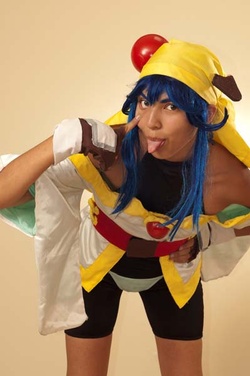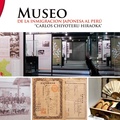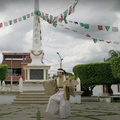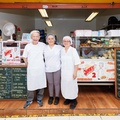Part 1 >>
THALÍA, THE ONEECHAN
Thalía Quispe studies geography and environment at the Catholic University and works in a pastry shop that on special occasions functions as a maid café (a themed restaurant, originally from Japan, in which the waitresses dress like maids and treat customers like masters).
What exactly is a maid ? Thalía explains: “The maid is an anime character who has a master whom she serves, takes care of him, does everything possible to make him well, to make him feel comfortable and happy. He looks at him when he feels alone and sad, she is like a sister, like an oneechan , she is always with him and is loyal to him.”
She identifies with the character: “I'm a bit similar because I like to care about people. Sometimes things are hard and you don't have anyone around; I like to be that person. Besides, I like dealing with people, making them laugh, it's nice.”
When otaku come to the establishment, Thalía greets them with the characteristic greeting of maid cafes: “ Okaerinasai goshujin sama ” (“Welcome home, sir master”). Talk to them and have fun.
There are no shortage of conventional clients who get upset when they see her dressed as a maid , but she downplays the matter. “There are everything, people who are kinder, less kind, but as long as I can make them smile it's fine,” he says.
Thalía, the maid , is sweet and helpful, has a small voice and seems incapable of being bothered. How much is truly her and how much is the character? There are both, he assures. He has studied theater and likes not only to dress like the character he plays, but also to get into his soul.
DADS, JUST GENTLEMAN
The parents of otaku boys and girls – or those who move in that world – sometimes do not sympathize with their children's hobbies.
Anita says that her parents have already accepted that she is a cosplayer . “What are they going to do,” he says. At first they were afraid, when she became known and became an involuntary host of virtual forums. They found out her phone number, called her, but the harassment stopped when the impact of her debut as a cosplayer faded.
Of course, they don't like me spending money on suits. However, Anita says that since she makes them herself, she only spends money on the fabrics. And for the wigs, which normally cost around 35 soles (the most she has paid was 180).
Thalía's parents are very strict, but they accept her. “They have taught me that I have to have my own way of thinking, my own tastes, and that I have to defend what I like and what I believe in. Therefore, they would contradict themselves if they forbade me from doing something, especially when it is not something bad, but healthy and fun. My dad is the one who has a little more problems, but not my mom. If it's something good, if I'm happy, and it doesn't bring me any problems, then it's fine," he reveals.
OTAKU OR NOT OTAKU ?
When people find out that Anita is a cosplayer , they immediately believe that she is also an otaku. She clarifies: “I'm not an otaku , I just like to dress up.”
However, outsiders put everyone in the same bag and Anita must face the prejudices of which manga and anime fans are victims: “That otaku are sick, that they only watch anime, that they want to go to to live no matter what in Japan, who do not leave their childhood, who are big little children.”
For her part, more than as an otaku , Thalía prefers to define herself as an “Asian fan” (she also likes, for example, Korean pop). And he fires off a brief speech to those who look at them like geeks : “They should not get carried away by what people say or by first impressions. They should understand the message, because behind the anime there is a teaching. I think that all people should be tolerant, that they take the time to get to know each other.”
Thalía draws lessons from anime. “I have learned many things about problems that people can have. Suddenly it is easier for me to give them advice because I feel that I have already seen many of those situations, so I know more or less what can happen. That helps me to be able to advise my friends, or know what to tell them when they feel alone or sad, or to be able to understand people I don't know very well,” he says.
When she was little, Anita wanted to go to Japan. He was struck by how they dressed, how they ate, and the landscapes in the anime he watched. How do you imagine Japan now? Her response, concise and direct like her: “Better than us, everything fast, skyscrapers, lots of people.”
Thalía likes visual kei bands, and mentions X Japan and Versailles, who recently played in Lima (“I was in the front row,” she remembers). He also likes old Japanese music. “It's very pretty, I'm not a specialist, but I like it,” he says.
Thalía's favorite Japanese food is maki . Anita's favorite dish is – it couldn't be any other way – onigiri with a manga and anime flavor.
* This article is published thanks to the agreement between the Peruvian Japanese Association (APJ) and the Discover Nikkei Project. Article originally published in Kaikan magazine No. 54, February 2011 and adapted for Discover Nikkei.
© 2011 Asociación Peruano Japonesa / © 2011 Fotos: Asociación Peruano Japonesa / Álvaro Uematsu
















